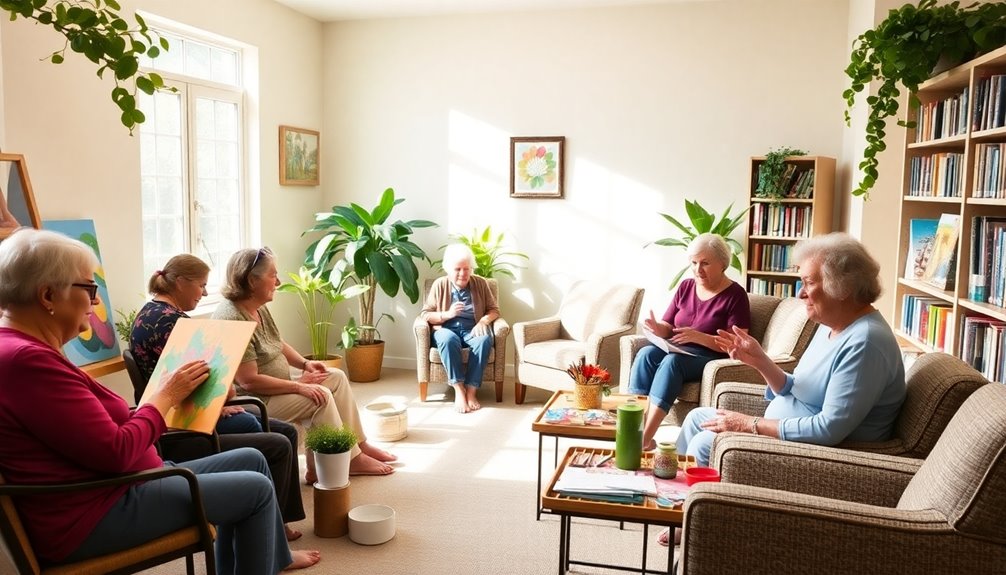If you're caring for a loved one, you might not know about incredible resources available to support you. Check out Area Agencies on Aging for local services and meals. Local caregiving organizations offer essential educational materials. Disease-specific websites provide tailored information, while dementia resources can help navigate complex needs. In-home care services lighten your load, and durable medical equipment lending closets save money. Veterans Affairs has unique benefits too. Explore these options and discover more hidden gems!
Key Takeaways
- Discover local Area Agencies on Aging (AAA) for tailored caregiver support, including respite care and resources specific to your area.
- Utilize Durable Medical Equipment lending closets to access essential mobility aids at little to no cost, easing financial strain on caregivers.
- Explore specialized support websites like the Alzheimer's Association and Parkinson's Foundation for targeted resources and educational materials.
- Engage with local caregiving organizations that host workshops, events, and provide advocacy initiatives to connect with other caregivers.
- Join faith community support programs that offer volunteer assistance, counseling, and social events to strengthen emotional connections and provide practical help.
Area Agency on Aging (AAA) Services

If you're looking for support as a caregiver or ways to help older adults in your life, the Area Agency on Aging (AAA) is an important resource.
Established by the Older Americans Act of 1973, AAAs offer a wealth of helpful resources tailored to meet the needs of seniors and their caregivers. You can access services like Meals on Wheels, which guarantees nutritious meals for older adults, and find senior centers that provide activities and socialization opportunities.
Additionally, AAAs connect you with crucial caregiver support, including information on respite care and local assistance programs. Many AAAs also provide resources that emphasize the importance of fostering open communication between caregivers and their loved ones.
To find your local AAA, visit the Elder Care Locator website or call 211, making it easier to manage your caregiving responsibilities effectively.
Local Caregiving Organizations

Local caregiving organizations play an essential role in supporting family caregivers by offering a range of resources designed to ease the challenges of caregiving. Organizations like the National Alliance for Caregiving and the Caregiver Action Network provide valuable caregiver resources, including educational materials and advocacy initiatives.
Many Area Agencies on Aging (AAA) also focus on caregiver support, offering access to meals and social activities that enhance well-being for both caregivers and their loved ones.
By attending workshops and events hosted by local caregiving organizations, you can connect with others on the same caregiving journey and gain critical insights.
Stay informed about upcoming resources by signing up for newsletters or following these organizations on social media to maximize your support network.
Disease-Specific Support Websites

Caregiving can become even more challenging when steering through specific health conditions. Disease-specific support websites are invaluable for addressing caregiver needs and providing tailored resources. Here are some key organizations you should consider:
| Condition | Organization | Support Services |
|---|---|---|
| Heart Disease | American Heart Association | Educational materials, online forums |
| Diabetes | American Diabetes Association | Care management tools, resources |
| Parkinson's Disease | Parkinson's Foundation | Targeted support, information |
These resources not only help you navigate the complexities of conditions like dementia care but also connect you with support services that understand the unique challenges caregivers face. Explore these sites to enhance your caregiving journey!
Dementia Care Resources

As you navigate the challenges of dementia care, having access to specialized resources can make a significant difference in your journey. Here are some invaluable options for dementia caregivers:
- Alzheimer's Association: Offers a 24/7 hotline for support and guidance on caregiving duties.
- Hilarity for Charity: Combines humor with practical information, fostering community among caregivers.
- Lewy Body Dementia Association: Provides tailored resources for caregivers dealing with Lewy Body dementia.
- Resources for Frontotemporal Degeneration (FTD): Focuses on the unique needs of caregivers supporting younger individuals diagnosed with FTD.
Engaging with these organizations can enhance your understanding of dementia and help you build valuable support groups.
Don't hesitate to reach out and explore these resources!
The Power of Support Groups

Finding a network of support is essential for anyone traversing the complexities of dementia care. Joining a support group can be a game-changer for family caregivers like you.
These groups offer therapeutic benefits by allowing you to share experiences and learn coping strategies from others facing similar challenges. You'll find that participating in a support group greatly reduces feelings of isolation and stress, making you feel understood and supported in your journey.
With both in-person and online options available, you can access helpful information regardless of your location. Research shows that engaging in these groups improves mental health and fosters resilience in managing caregiving responsibilities. Additionally, understanding emotional dysregulation can aid in navigating the challenges of caregiving.
Finding the right support group tailored to your needs enhances community and connection, making your caregiving experience more manageable.
Understanding Respite Care

Respite care offers you a much-needed break, allowing you to recharge and manage stress effectively.
There are various types of respite options available, from adult day centers to short-term residential stays, tailored to your needs.
Types of Respite Care
When you're feeling overwhelmed as a caregiver, exploring the different types of respite care can provide the relief you need.
Understanding these options can help you manage responsibilities and avoid burnout.
Here are four types of respite care to evaluate:
- Family Relief: A trusted family member steps in to care for your loved one.
- Adult Day Centers: These facilities offer daytime supervision and social activities for your loved one.
- Short-Term Residential Stays: Your loved one stays temporarily at a care facility, giving you a break.
- In-Home Respite Care: Professional caregivers visit your home to provide care.
Finding Respite Resources
As you navigate the challenges of caregiving, knowing where to find respite resources can make a significant difference in your well-being. Proactively seeking respite care helps you recharge and prevents burnout. Here's a table to help you identify ways to find support:
| Resource Type | Description |
|---|---|
| Area Agencies on Aging (AAA) | Local agencies offering care services and resources |
| Online Searches | Websites and directories for respite options |
| Ark National Respite Center | Offers a respite locator tool to find services |
| Local Grants | Financial assistance for caregivers, especially those supporting dementia patients |
| Adult Day Centers | Day programs providing care and activities for adults |
Additionally, it's essential to recognize that emotional support from friends and family can significantly enhance your ability to cope with the demands of caregiving. Understanding the importance of long-term financial planning for respite care can also provide additional peace of mind for caregivers.
Benefits for Caregivers
Understanding the benefits of respite care is essential for caregivers like you, who often juggle multiple responsibilities.
Respite care offers crucial support, allowing you to recharge and maintain your health. Here are four key benefits:
- Prevents Burnout: Taking breaks helps you avoid the exhaustion that can come with constant caregiving.
- Flexible Options: With choices like family relief and adult day centers, you can find what works best for you.
- Proactive Care: Seeking respite care can prevent crises by giving you time for self-care.
- Resource Access: Tools like the Ark National Respite Center's locator help you find local options, making support easier to access. Additionally, pet therapy can enhance emotional well-being, providing comfort during your time away.
In-home Care Services

In-home care services offer essential support for families, enabling you to balance your caregiving duties while ensuring your loved ones receive the care they need in a familiar environment.
These services include personal care assistance, medication management, companionship, and skilled nursing care, all tailored to meet individual needs.
Many agencies provide flexible scheduling options, ranging from just a few hours a week to 24/7 care, allowing you to find the right balance between your responsibilities and personal time.
Costs typically range from $20 to $40 per hour, depending on the level of care required.
For more information, you can access resources through the Caregiver Action Network or local Area Agencies on Aging to help you navigate available in-home care options.
Durable Medical Equipment Lending Closets

If you're looking for affordable solutions for your caregiving needs, durable medical equipment lending closets can be a lifesaver.
These community-based resources often provide essential items like walkers and wheelchairs at little to no cost, helping you save money.
Plus, with tools like Adaptive Equipment Corner, finding a nearby closet is easier than ever.
Accessing Local Closets
How can you access durable medical equipment (DME) without breaking the bank?
DME lending closets are a lifesaver for caregivers looking to borrow essential items affordably.
Here's how to find one near you:
- Contact Local Area Agencies on Aging (AAAs): They often have information about nearby DME lending closets.
- Use the Adaptive Equipment Corner: This resource can help locate lending closets based on your specific needs.
- Explore Community Centers: Many local centers host DME lending closets, relying on community donations.
- Check Online Directories: Websites often list equipment lending resources available in your area.
Cost-Saving Benefits
Accessing durable medical equipment (DME) through lending closets not only alleviates financial strain but also guarantees you have necessary tools at your fingertips.
For caregivers, these closets offer significant cost-saving benefits, as many DME items can be expensive and often aren't covered by insurance.
Local lending closets provide access to essential equipment like walkers and wheelchairs at little to no cost, easing the financial burden on families in need of health care resources.
By utilizing these programs, you not only save money but also promote sustainability by reusing equipment that might otherwise go unused.
Many communities have established lending programs run by local non-profits, highlighting the crucial role of community support in caregiving.
Veterans Affairs Caregiver Benefits

While caring for a veteran can be rewarding, it often comes with unique challenges that warrant additional support.
Fortunately, the Veterans Affairs (VA) offers several benefits to ease your journey as a caregiver:
- Aid and Attendance Benefits: Financial assistance based on military service duration.
- VA Caregiver Resource Center: Access to resources, information, and a dedicated hotline for caregivers.
- Comprehensive Assistance for Family Caregivers Program: Provides training and support, stipends, health insurance, and respite care options.
- Local VA Facilities: Tailored resources and support services for caregivers of veterans with service-connected disabilities.
These programs recognize your invaluable role and aim to enhance caregiver support, ensuring you have the necessary tools to thrive.
Faith Community Support Programs

Supporting caregivers goes beyond government benefits; faith communities play a vital role in this journey. Many faith organizations offer caregiver support through volunteer programs that provide transportation to religious services, helping aging members stay connected to their spiritual roots. Additionally, these programs often promote the importance of maintaining involvement in the lives of those they care for, ensuring emotional connections remain strong. Engaging in top wellness tips can also help caregivers maintain their health and well-being while supporting others.
They also host counseling services and support groups focused on addressing the emotional needs of caregivers, creating safe spaces for sharing experiences. With the rise of online services, you can now access virtual spiritual support groups from home, making it easier to find community.
Additionally, faith communities organize social events, fostering fellowship among caregivers and those they care for. Practical assistance like meal delivery or companionship can also alleviate daily burdens, ensuring caregivers feel supported and valued. Engaging in personal growth journeys after caregiving experiences can lead to newfound self-awareness and empowerment.
Frequently Asked Questions
What Resources Do Caregivers Need Most?
As a caregiver, you need access to local Area Agencies on Aging for essential services like Meals on Wheels and community support.
Disease-specific resources are critical, especially if you're caring for someone with a chronic condition.
Don't overlook the importance of support groups, which help you connect with others facing similar challenges.
Respite care options are important for your well-being, allowing you to recharge and prevent burnout.
Finally, consult local pharmacists for medication management advice.
What Is the Caretaker's Syndrome?
Did you know that 40-70% of family caregivers experience significant symptoms of depression?
Caregiver's Syndrome is the emotional and physical toll you face while providing care, often leading to burnout, anxiety, and feelings of isolation.
You might neglect your own health, facing issues like high blood pressure or chronic illnesses.
Recognizing the signs early and seeking support can help alleviate these symptoms and improve your overall well-being.
Don't hesitate to prioritize yourself!
What States Pay You to Take Care of a Family Member?
Several states pay you to take care of a family member through Medicaid-funded programs.
In California, for instance, you can earn around $15 to $20 per hour, depending on your location.
New Mexico and Vermont offer "Cash and Counseling" programs, allowing you to receive direct payments for your caregiving services.
To qualify, you'll need to complete an application that assesses your family member's needs and meets state regulations for caregiver compensation.
What Is the Main Struggle of a Caregiver?
You might picture a caregiver as a superhero, but the reality often feels overwhelming.
The main struggle for you as a caregiver is balancing emotional and physical fatigue while managing the relentless demands of your role.
It's tough to navigate financial strain, social isolation, and the lack of respite care.
You might feel lost, grappling with the complexities of chronic conditions, and often, that sense of loneliness can weigh heavily on your mental health.
Conclusion
In your journey as a caregiver, discovering diverse resources can dramatically enhance your experience. By tapping into local organizations, support groups, and specialized services, you'll find the strength and support you need. Don't hesitate to explore the wealth of wisdom available through these incredible avenues. Remember, you're not alone; you're part of a vibrant village of caregivers. Embrace the connection and compassion that comes from sharing this significant path with others. You've got this!









